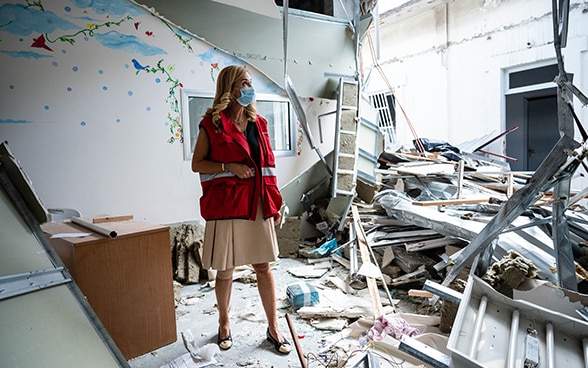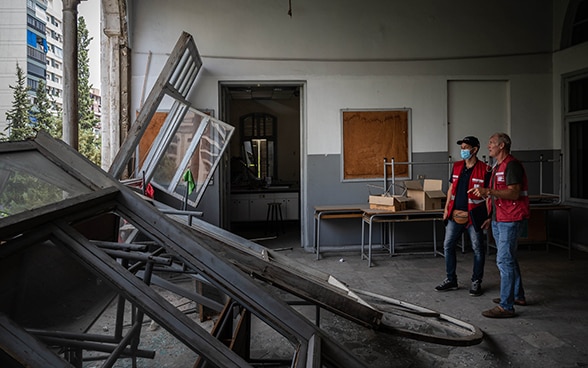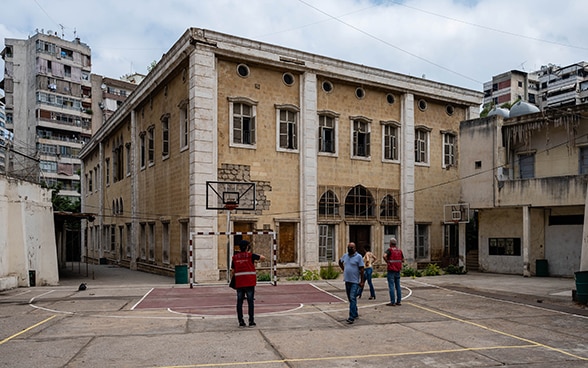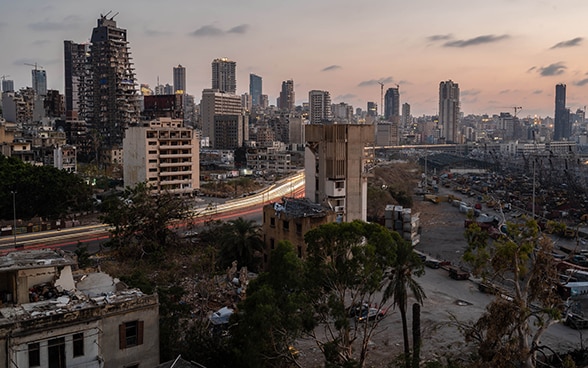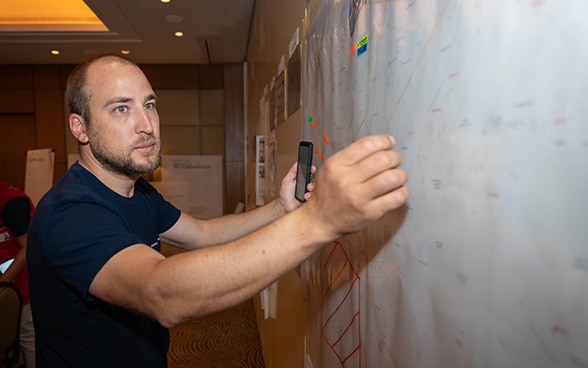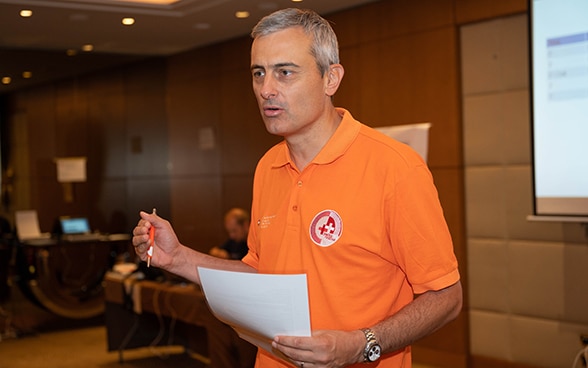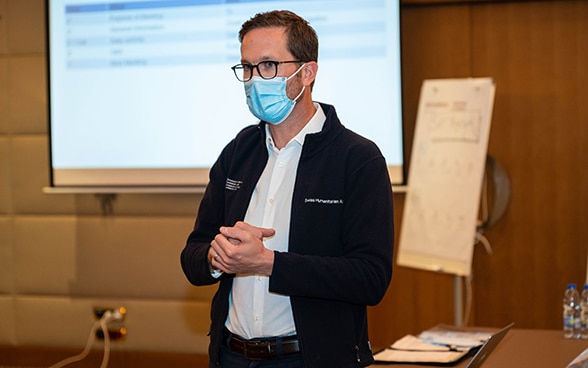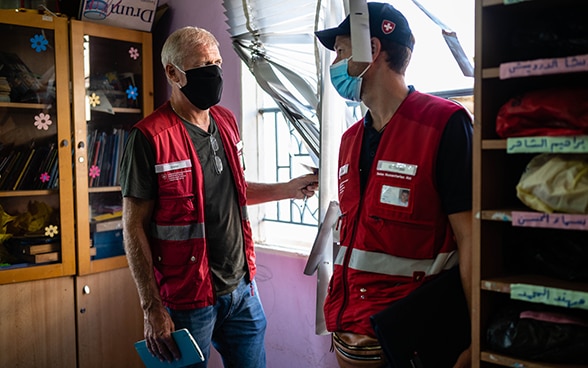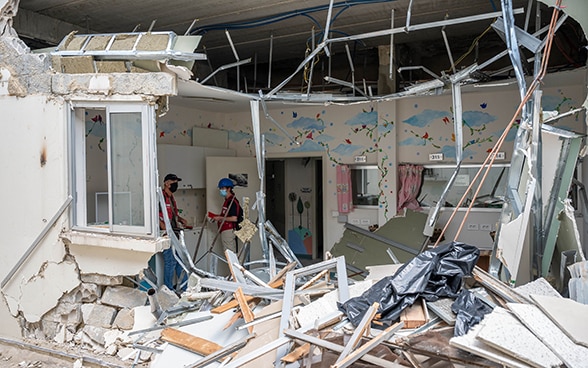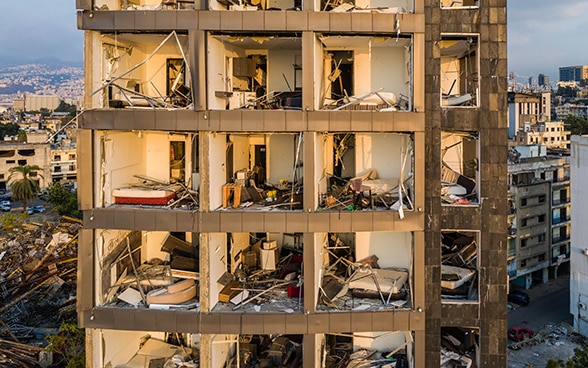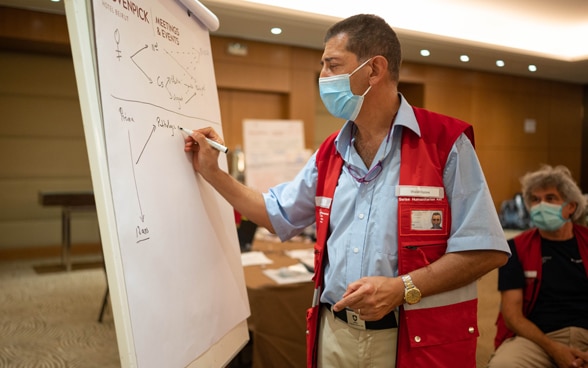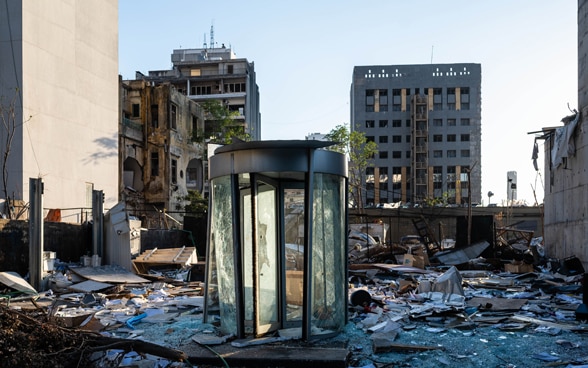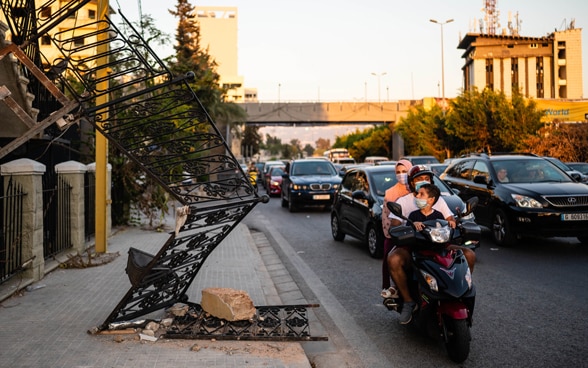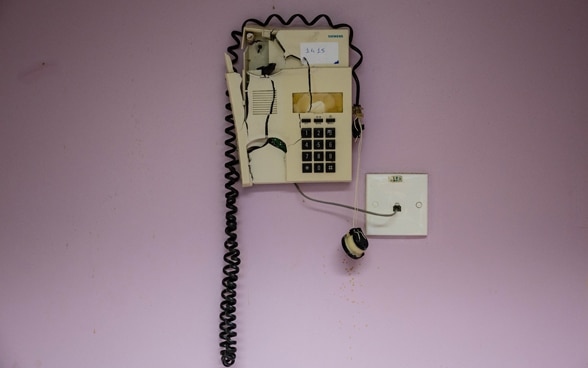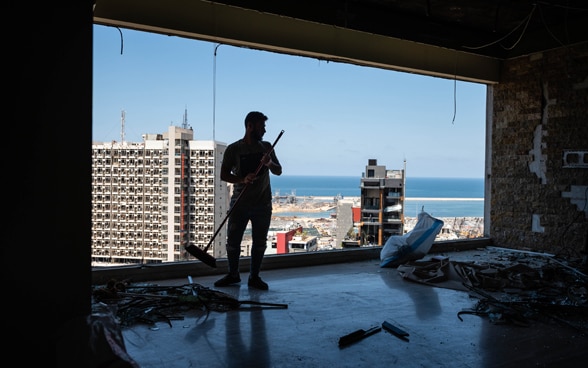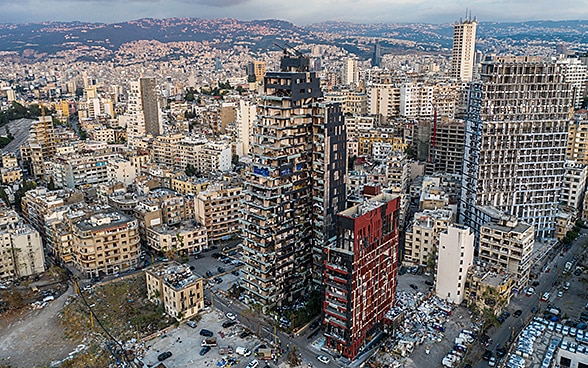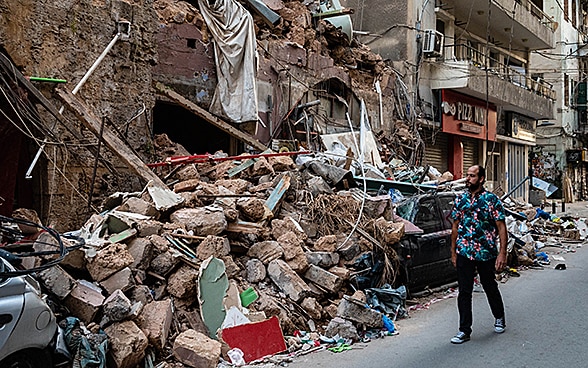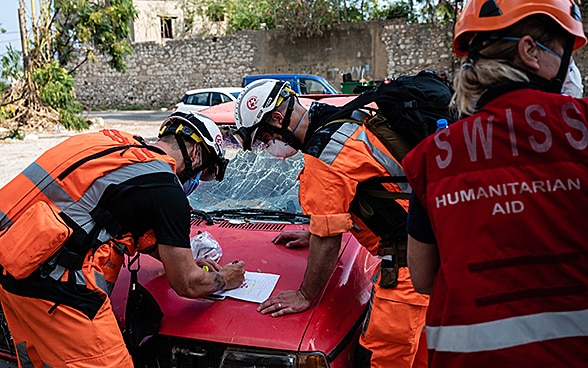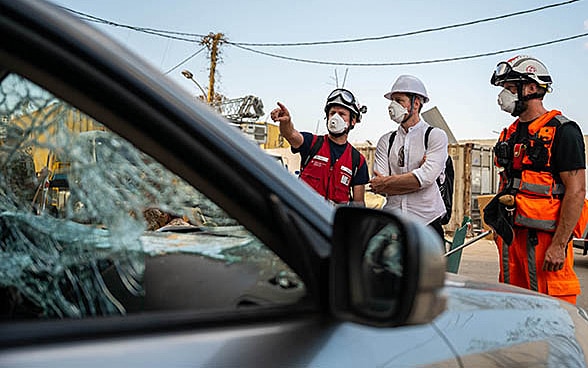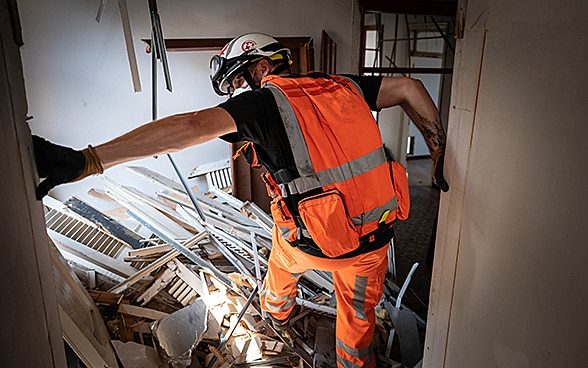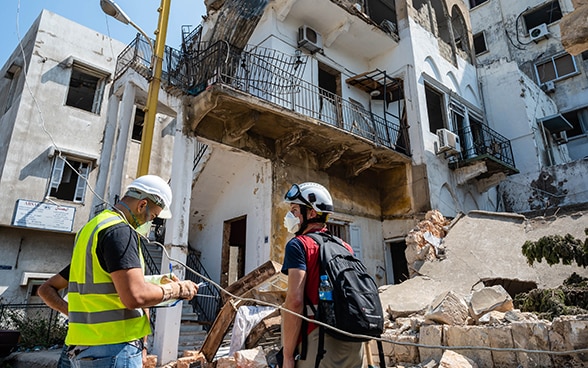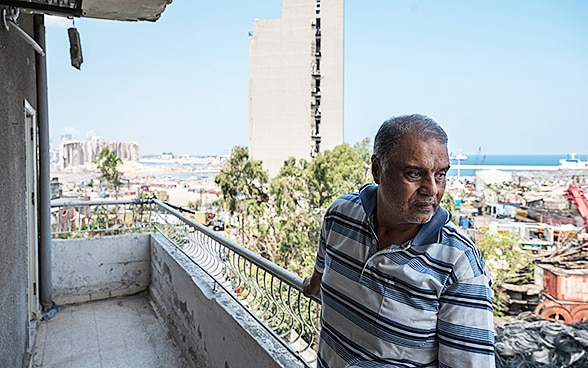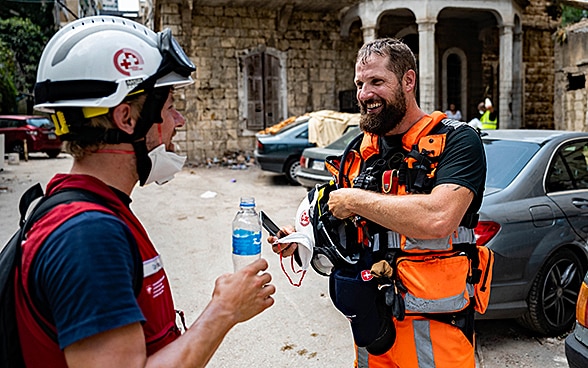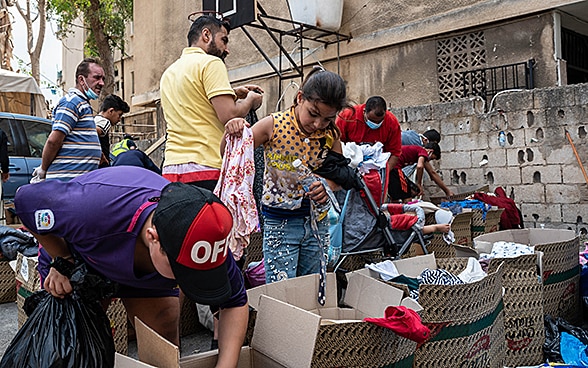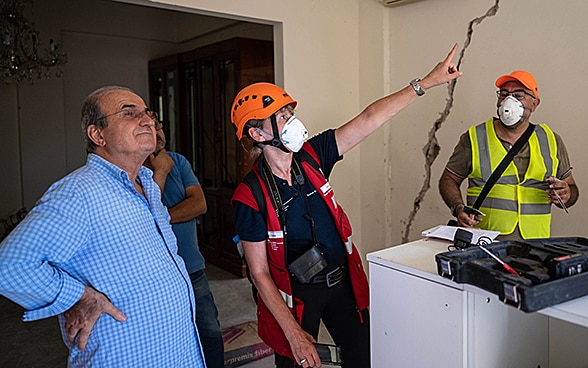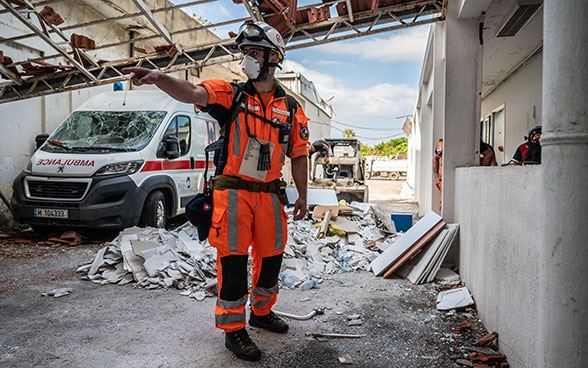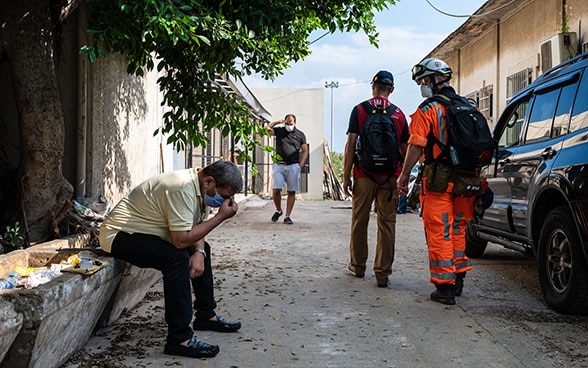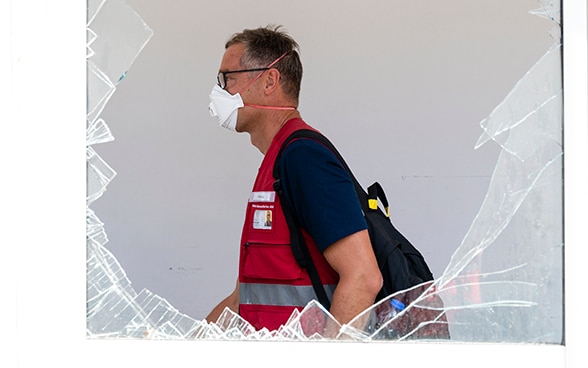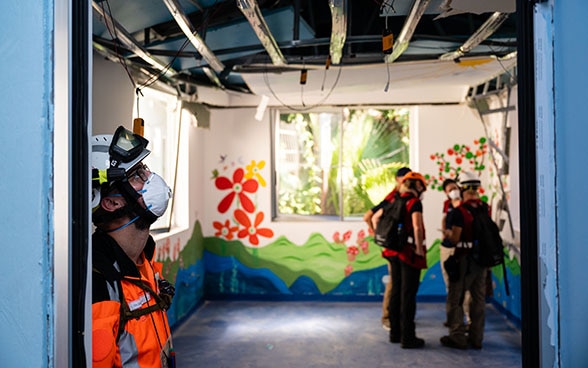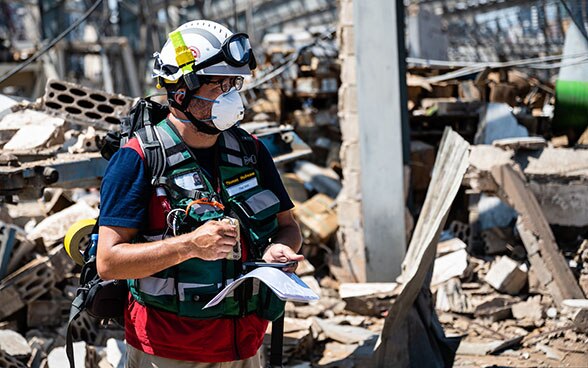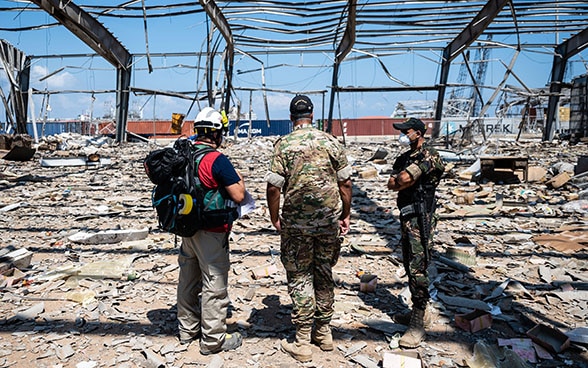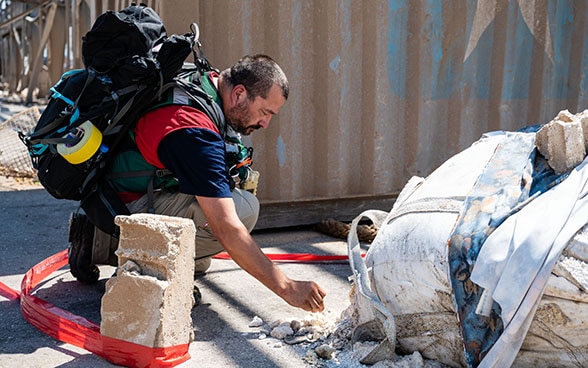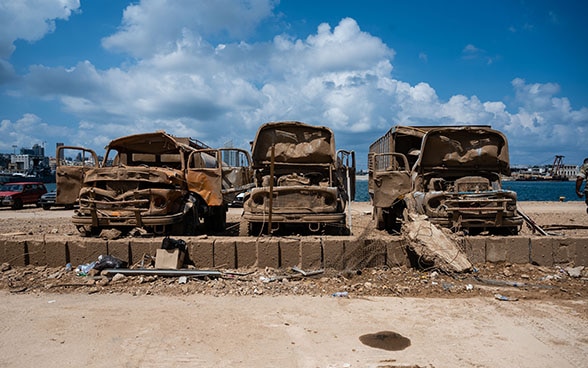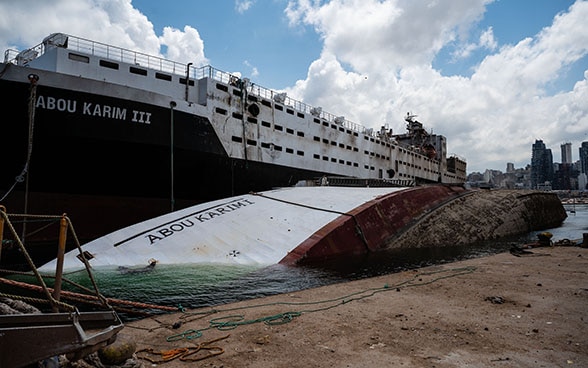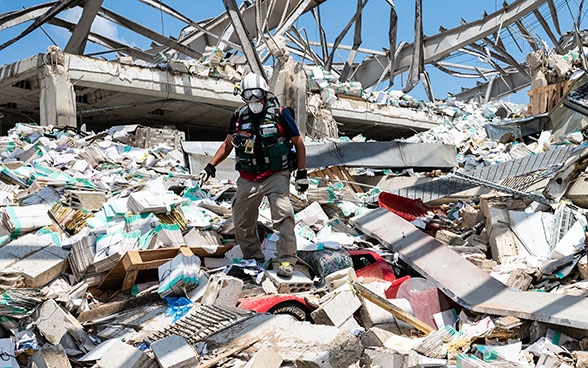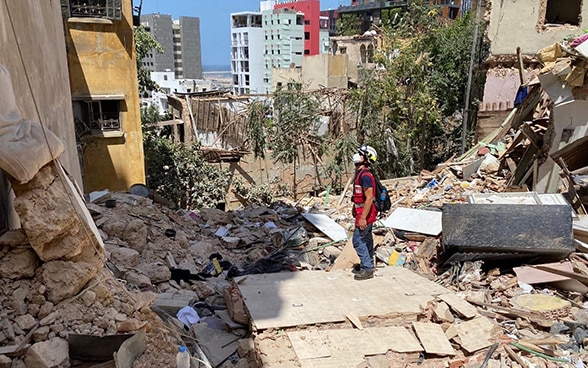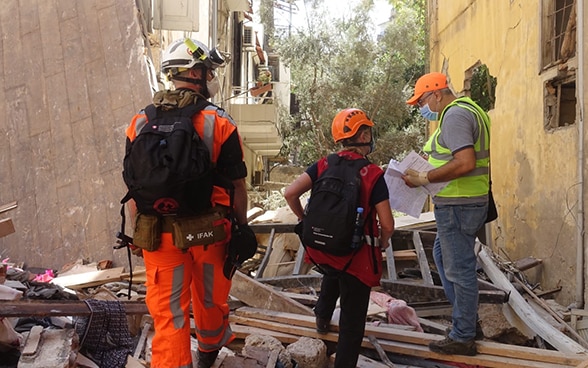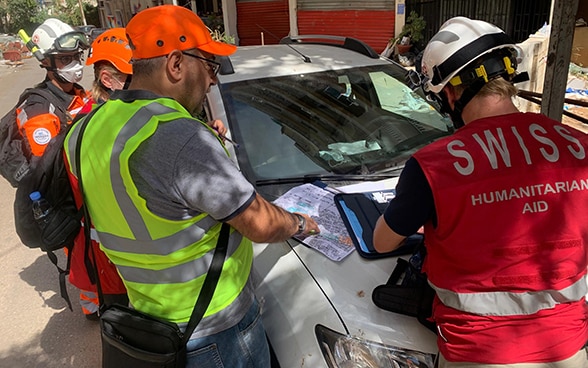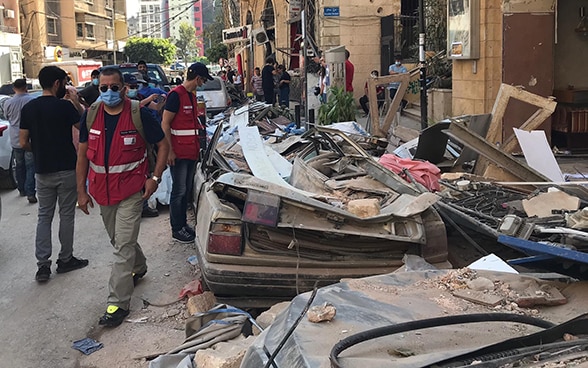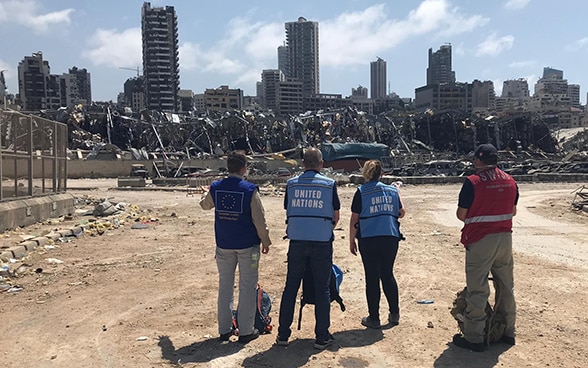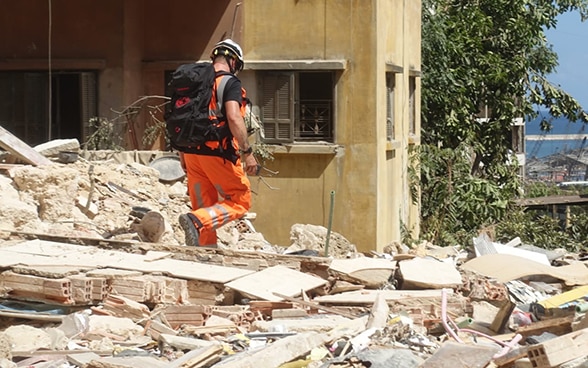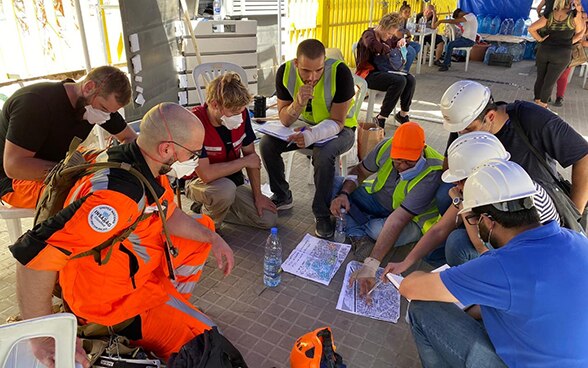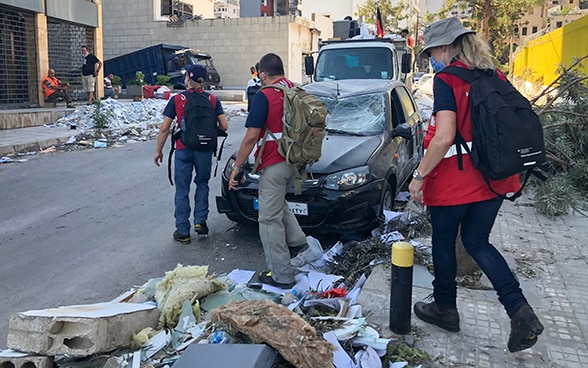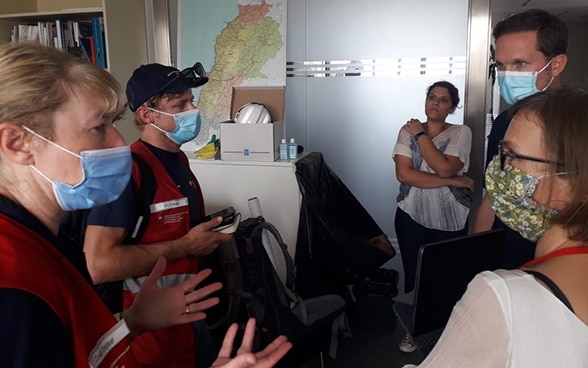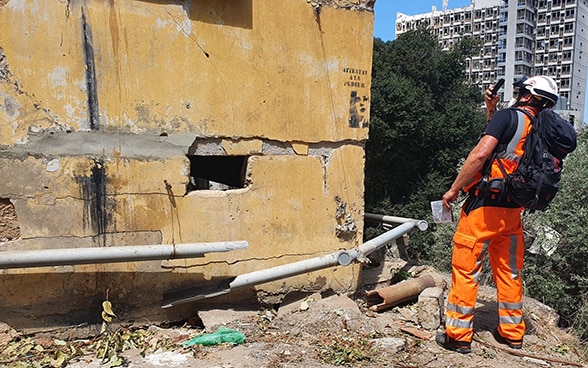80 damaged buildings inspected, schools and hospitals repaired
On 4 August 2020 the Lebanese capital was shaken by a violent explosion. Since then, 38 members of the Swiss Humanitarian Aid Unit (SHA) have helped to cope with the immediate consequences of the explosion. They checked the stability of damaged buildings, supported maternal and child health care and helped repair 19 schools. The emergency operation will end on 5 September 2020.
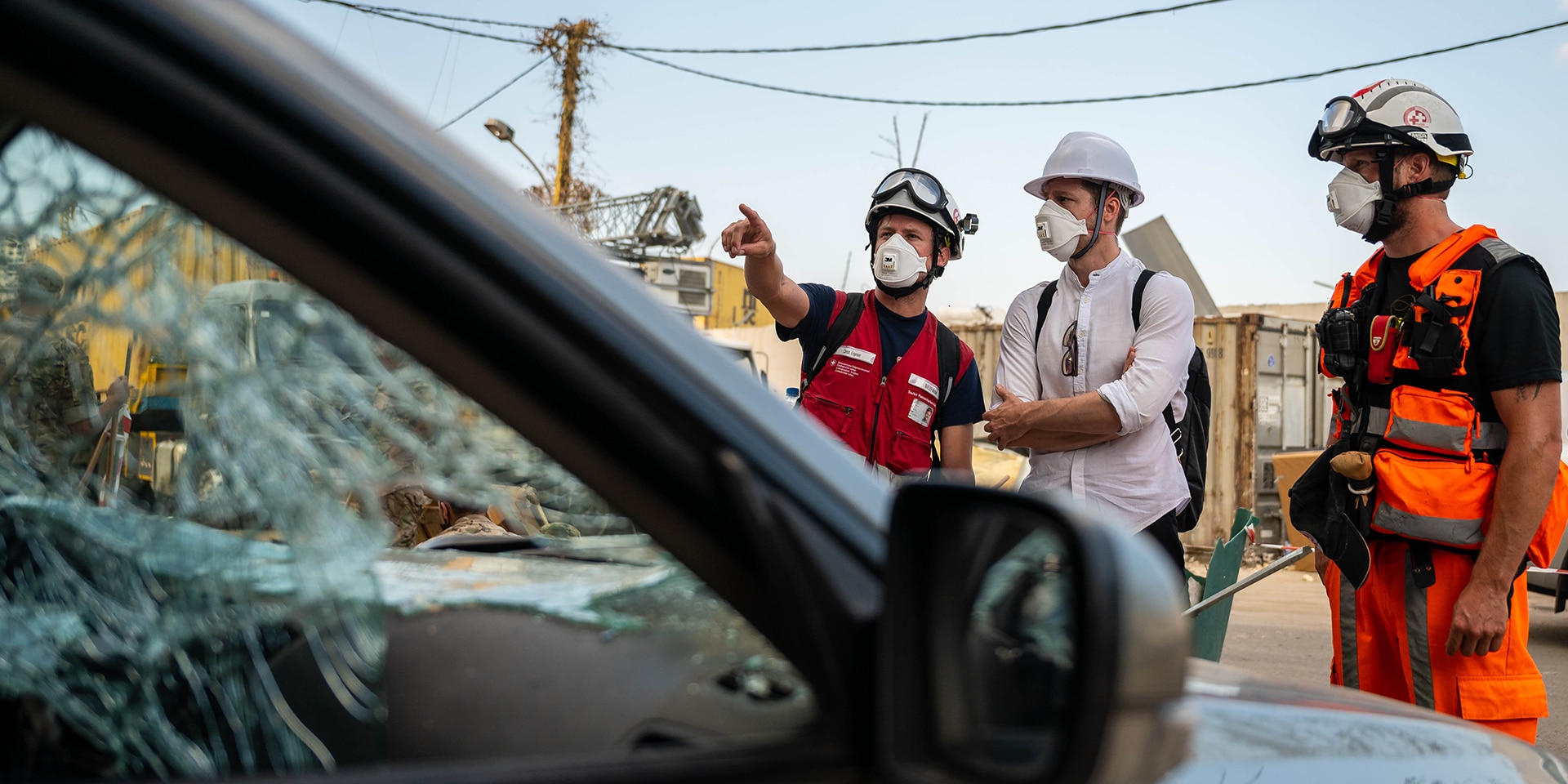
In addition to financial support, Switzerland has already sent several specialist humanitarian aid teams to Lebanon in recent days. © FDFA
10.09.2020 – 16.00
Swiss Humanitarian Aid has completed its emergency response mission in Beirut. Claude Wandeler, deputy head of the Middle East and North Africa Division – Humanitarian (MENA-H), talks about his role as team leader and coordinator on the ground of the first Swiss teams sent to Beirut after the explosion. He highlights the complementarity between the emergency response and Switzerland's existing cooperation projects in the region.
"Mutual trust and communication are our team's driving force"
04.09.2020 – 15.00
Swiss Humanitarian Aid completes rapid response mission in Beirut: 80 buildings inspected, numerous schools and hospitals repaired
Over the past month, 38 experts deployed by the Swiss Humanitarian Aid Unit (SHA) have been working in the Lebanese capital to assist in the immediate aftermath of the explosion on 4 August 2020. They have examined the stability of damaged buildings, supported maternal and child health care in two hospitals and helped to repair 19 schools. Swiss Humanitarian Aid's rapid response mission comes to an end on 5 September, with further support measures entrusted to the Swiss cooperation office at the Swiss embassy in Beirut.
One month after the devastating explosion in Beirut, the consequences are still very much in evidence in the Lebanese capital. Switzerland sent experts from the Swiss Humanitarian Aid Unit to Beirut within 40 hours of the blast. A total of 38 SHA members have been deployed in Beirut to date, seven of whom are still on the ground.
The explosion in Beirut's port on 4 August claimed some 180 lives and injured over 6,500 people. The shock wave triggered by the blast destroyed entire streets in the vicinity of the port. In addition, 178 schools and several hospitals were damaged or destroyed. The Swiss embassy also sustained damage.
- Swiss experts have undertaken over 80 building safety inspections since 4 August. This entailed analysing the habitability of damaged buildings in conjunction with local officials. The building which houses the Swiss embassy as well as the ambassador's residence and the apartments of embassy staff also had to be inspected. The embassy was able to resume its activities within a few days of the explosion. The Swiss ambassador and her team supported the SHA members in their work in Beirut.
- The Swiss Agency for Development and Cooperation (SDC) sent additional medical staff and 1,500kg of materials to Beirut to support maternal and child care in two hospitals. One of these hospitals has already reopened. Repairs are nearing completion at the other hospital, which is now already treating children again.
- Swiss construction experts are also supporting the repair work at 19 state schools. The schools are being selected in cooperation with Lebanon's Ministry of Education, with particular emphasis on schools for the poorer sections of the Lebanese population and for Syrian and Palestinian refugees. This support will enable some of the schools to resume teaching at the end of September 2020. The SDC is also contributing to a Caritas Switzerland project in Beirut to improve access to quality education.
Rapid deployment to be completed on 5 September 2020
In total, the SDC is providing around CHF 6 million to support the population in Beirut. Of this, CHF 2 million is allocated each to direct support in the health sector and education. CHF 1 million is earmarked for the Caritas Switzerland project. The remaining CHF 1 million will be halved between the Lebanese Red Cross and the International Federation of Red Cross and Red Crescent Societies (IFRC).
Swiss Humanitarian Aid's rapid response mission comes to a close on 5 September 2020, with the SHA experts returning to Switzerland. Support operations following the explosion in Beirut will then be handed over to the Swiss cooperation office at the Swiss embassy and a Swiss construction expert.
28.08.2020 – 11.00
Several hospitals were damaged in the explosion in Beirut. Jean-Daniel Junod, a nurse anaesthetist from the Geneva University Hospitals, was part of the team specialising in mother and child medical care sent by the Swiss Humanitarian Aid. For Jean-Daniel Junod, the mother and child module's strength lies in working closely with local medical personnel. Support and assistance are what is needed to make a real difference in the long term.
”The relationships continue even after the return to Switzerland”
18.08.2020 – 17.00
Several teams from the Swiss Humanitarian Aid Unit have been working in Beirut for several days now. Structural engineer Regina Wenk was part of the first team sent out. Having previously worked in many disaster-hit areas, she is well used to entering buildings that have suffered extensive damage. After her inspection, the occupants at least know whether they can safely return home or have to evacuate the building.
Experts on the ground in Beirut: interview with structural engineer Regina Wenk
17.08.2020 – 10.00
The violent explosion damaged numerous hospitals in Beirut, four of them heavily. 500 hospital beds, which are urgently needed, are not available. More than 120 schools were also damaged. In addition to health care, repairing the damaged schools is an important goal for the experts of the Swiss Humanitarian Aid Unit, to ensure that thousands of children and young people can once again have access to education.
14.08.2020 – 14.00
The immense scale of the explosion in the Lebanese capital on 4 August has severely affected the country's health system. On 13 and 14 August 2020, the Federal Department of Foreign Affairs sent more Swiss Humanitarian Aid Unit experts to Beirut.
Beirut explosion: Switzerland's emergency aid focuses on health and building safety
14.08.2020 – 12.00
Especially the region around the port and the Karantina residential district in Beirut were heavily damaged in the explosion a week ago. Numerous buildings have been completely destroyed, many apartments and houses are no longer habitable. Swiss experts from Swiss Humanitarian Aid Unit are still on duty in the Lebanese capital.
12.08.2020 – 11.00
Swiss Humanitarian Aid experts have been working in Beirut for several days without interruption. Following the devastating explosion a week ago, large parts of the Lebanese capital are still under debris. The two teams of medical and construction technology specialists are working closely with national and international partners on the ground. A physically demanding and emotionally challenging task; captured in a gallery.
11.08.2020 – 16.00
For several days now, two teams of the Swiss Humanitarian Aid Unit have been supporting the people of Beirut in Lebanon. Two teams of medical and construction technology specialists are working in close coordination with Lebanese and international partners. Among them are engineers and infrastructure specialists, logistics experts, physicians, a telecommunications specialist and a psychologist.
09.08.2020 – 16.00
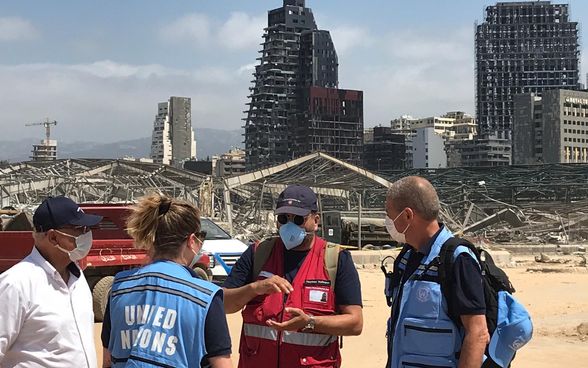
At an international donor conference for Lebanon, Switzerland pledged at least four million francs in direct aid. The contribution to humanitarian aid and development is aimed at the construction, housing and health sectors and is intended to benefit the most vulnerable population groups in particular. The video conference took place on Sunday at the invitation of the Secretary General of the UN, António Guterres, and the President of France, Emmanuel Macron. Switzerland was represented at the conference by Manuel Bessler, Delegate of the Federal Council for Humanitarian Aid. In addition to financial support, Switzerland has already sent several specialised humanitarian aid teams to Lebanon in recent days. Two teams with medical and construction specialists are already on site. They are working in close coordination with Lebanese and international partners.
08.08.2020 – 12.00
Switzerland sent a second team to Lebanon for additional support. The team of ten includes medical and construction specialists from the Swiss Humanitarian Aid Unit (SHA). They will be accompanied by three army specialists from the Engineer/Civil Protection/NBC training unit. Swiss Humanitarian Aid will focus on the areas of accommodation and medicine. In these areas, the needs are particularly great in Beirut.
07.08.2020 – 15.00
A team of Swiss specialists arrived in Beirut on 6 August 2020. Thanks to their expertise and their experience, the members of the Swiss Humanitarian Aid Unit are able to provide rapid assistance on the ground and identify where further Swiss support makes sense. The team's mission is coordinated by Swiss Humanitarian Aid in Bern. Silvio Flückiger, head of the Staff Office and deputy head of the Humanitarian Aid Department, explains the stages from the first news of a disaster to the dispatch of the team.
06.08.2020 – 13.00
Switzerland dispatches a team of specialists
A team of Swiss specialists including civil engineers and logistics experts travelled to Beirut on 6 August 2020 in response to an international appeal for help from the Lebanese authorities following the devastating explosion.
Following the explosion in the port of Beirut, which claimed over one hundred lives, injured thousands of people and destroyed or rendered uninhabitable a large number of buildings, the Federal Department of Foreign Affairs (FDFA) has sent a team of specialists to the city to provide emergency assistance. A team comprising members of the Swiss Humanitarian Aid Unit (SHA) and a security specialist from the Crisis Management Centre (KMZ) is currently en route to Beirut. The team includes engineers and infrastructure specialists, logistics experts, a telecommunications specialist and a psychologist. One of their tasks will be to assess the structural integrity of buildings. The blast also caused serious damage to the Swiss embassy and the Swiss ambassador's residence. The Swiss team will also assist the Lebanese authorities in assessing the structural integrity of public buildings such as schools and hospitals.

Switzerland is contributing CHF 500,000 to the Lebanese Red Cross for emergency assistance for the local population. SHA personnel will also carry out an on-site assessment of the situation to determine what additional support Switzerland can provide. If requested by the Lebanese authorities, this could include construction and structural engineering assistance as well as the provision of shelter and medical supplies, medical care and support for local medical staff.
The Swiss embassy in Beirut is still working to establish whether Swiss nationals are among the victims of the explosion on 4 August 2020. There are no indications of any Swiss victims to date.
05.08.2020 – 16.45

Monika Schmutz Kirgöz: "The scenes in hospitals and on the streets are indescribable"
The explosion in the port area of Beirut has severely damaged the Swiss embassy building, with the Swiss ambassador sustaining minor injuries. However, Ambassador Monika Schmutz Kirgöz says that the embassy was fortunate to avoid the worst.
Ms Schmutz, you were injured in the explosion. How are you?
Thank you. Yes, I suffered minor injuries in the blast and then received treatment in hospital. Given the circumstances, I'm fine. The scenes in the hospitals and on the streets are indescribable and I'm impressed by the dedication of all the medical staff, for whom I have the greatest respect. I experienced and witnessed an amazing show of spontaneous solidarity yesterday. I had to walk to a nearby hospital, accompanied by colleagues, with the whole street covered in blood and debris.
But I now feel extremely grateful that my team and all my family are safe, and realise we are very lucky to emerge from the blast relatively unscathed.
My thoughts are with the people of Lebanon and especially with the victims and their families.
Can you describe what you experienced yesterday afternoon?
No one who experienced the event is ever likely to forget it and neither will I. I was in my office at the embassy when the explosion occurred. The blast hit me so forcefully that it literally threw me across the room.
What is the current situation in Beirut?
The situation is still unclear. The numbers of injured (currently around 4,000) and dead (currently over a hundred) are constantly being revised upwards. All the buildings in a large radius around the port have been damaged. The Swiss embassy and residence are located in East Beirut, only about 600m away from where the explosion occurred. This area has sustained the worst damage.
We are liaising with the local authorities to ascertain what specific assistance Switzerland can provide to Lebanon. You will have already seen that Federal Councillor Ignazio Cassis stressed last night that Switzerland stands ready to support Lebanon.
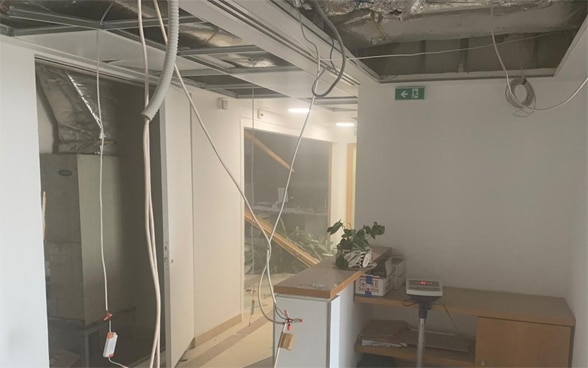
The embassy has been badly damaged. Is it possible to carry on working?
Yes, the embassy was badly damaged and will have to remain closed until further notice. My team and I are now working flat out from another location in cooperation with the Crisis Management Centre in Bern. We are staying in close contact with Swiss nationals in Lebanon.
Audio: Interview with Monika Schmutz Kirgöz, Swiss Ambassador to Lebanon (DE)
05.08.2020 – 15.30
Appeal for help from Lebanon: Swiss Humanitarian Aid examines possibilities
One day after the devastating explosion in Beirut, Swiss Humanitarian Aid is examining the possibility of sending humanitarian assistance to the site following an international appeal for help launched by the Lebanese authorities.
On Thursday morning, the FDFA will dispatch a team of experts to support its embassy in Beirut, which has suffered extensive damage. An aircraft of the air transport service of the Swiss Confederation will take off from Bern-Belp airport. On board will be about ten people, including engineers, infrastructure specialists, a security advisor, a logistician, a telecommunications manager and a psychologist. They will provide support to the embassy team in various areas.
Since many buildings in the Lebanese capital have suffered enormous damage, the infrastructure engineers deployed by Humanitarian Aid will also be able to provide their expertise to the Lebanese authorities.
05.08.2020 – 09.00
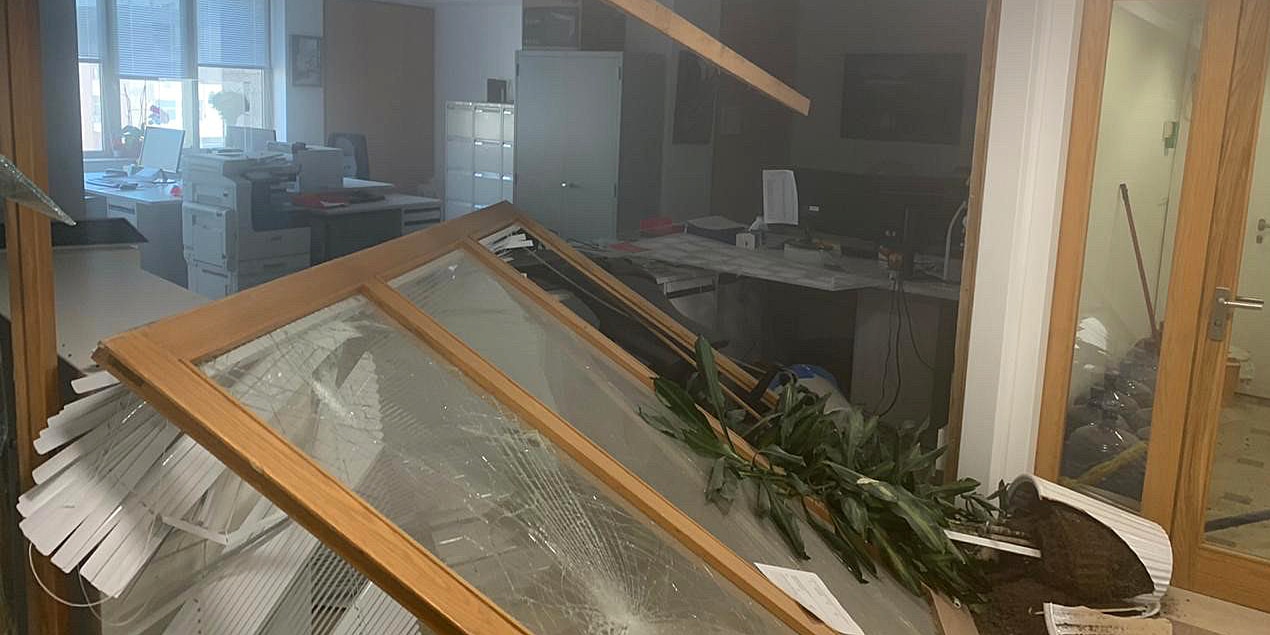
So far no information on possible Swiss victims
The Federal Department of Foreign Affairs (FDFA) currently has no information on possible Swiss victims in Beirut. There are currently 1500 Swiss citizens living in Lebanon. In addition, around 20 Swiss tourists are currently registered with the Swiss Embassy.
The Swiss Embassy was badly damaged in the explosion on Tuesday afternoon in the Lebanese capital. The Swiss Ambassador and a local employee were slightly injured. The Swiss Ambassador was able to resume her work on Wednesday. The rest of the Swiss Embassy staff and their immediate family members were not injured, but some are in shock.
04.08.2020 – 22.00
Federal Councillor Ignazio Cassis offers condolences and assistance
In a tweet published on Tuesday evening, Federal Councillor Ignazio Cassis expressed his condolences to the Lebanese authorities and the Lebanese people. In addition, the head of the FDFA stated that Switzerland was prepared to provide Lebanon with rapid assistance.
Under the leadership of the crisis management centre, the FDFA immediately mobilised its services on Tuesday evening to examine the needs and modalities of such Swiss assistance. The work is underway.
04.08.2020 – 20.00
Swiss Ambassador slightly injured in explosion in Beirut
A violent explosion in a warehouse in the port of Beirut shook the Lebanese capital late Tuesday afternoon. According to media reports, numerous people were injured. Fatalities are also feared.
The enormous shock wave caused windows to burst even at a distance of several kilometers. The Swiss embassy and the residence of the Swiss ambassador were also heavily damaged. Ambassador Monika Schmutz suffered minor injuries and has gone to hospital for further examination. The rest of the embassy staff are in good health, but a local staff member has not yet been reached.
The Swiss representation is clarifying whether other Swiss nationals are affected by the explosion. So far there are no indications of this.
Links
- Interview – "Each assignment is unlike any other"
- Interview – Experts on the ground in Beirut: interview with structural engineer Regina Wenk
- Article – Beirut explosion: Switzerland's emergency aid focuses on health and building safety
- Interview – ”The relationships continue even after the return to Switzerland”
- Interview – "Mutual trust and communication are our team's driving force"

